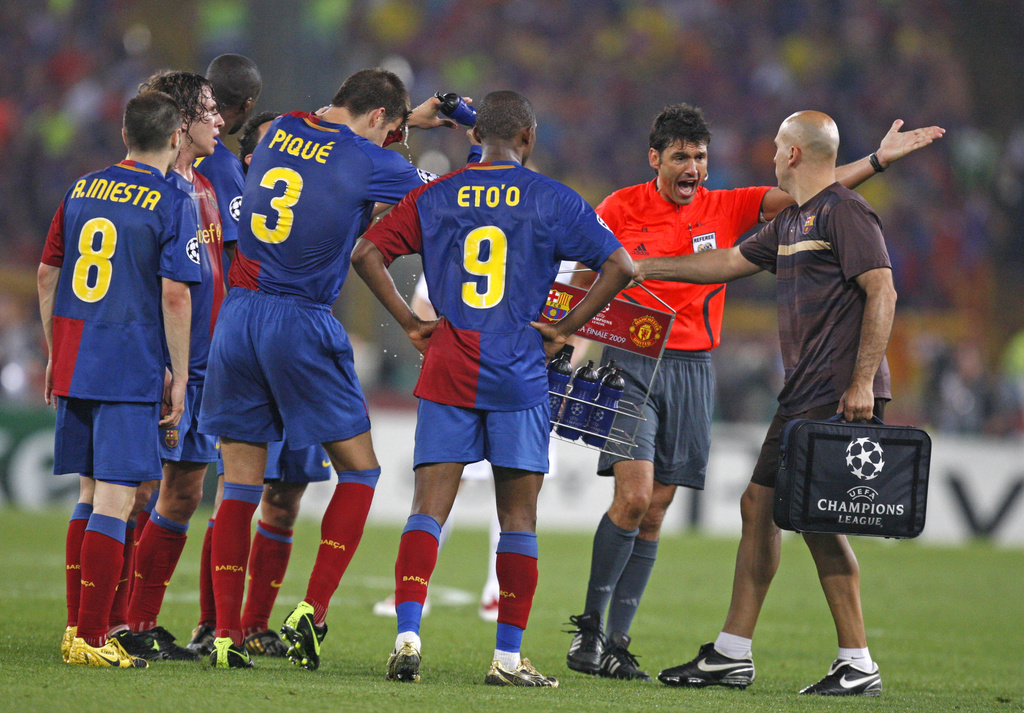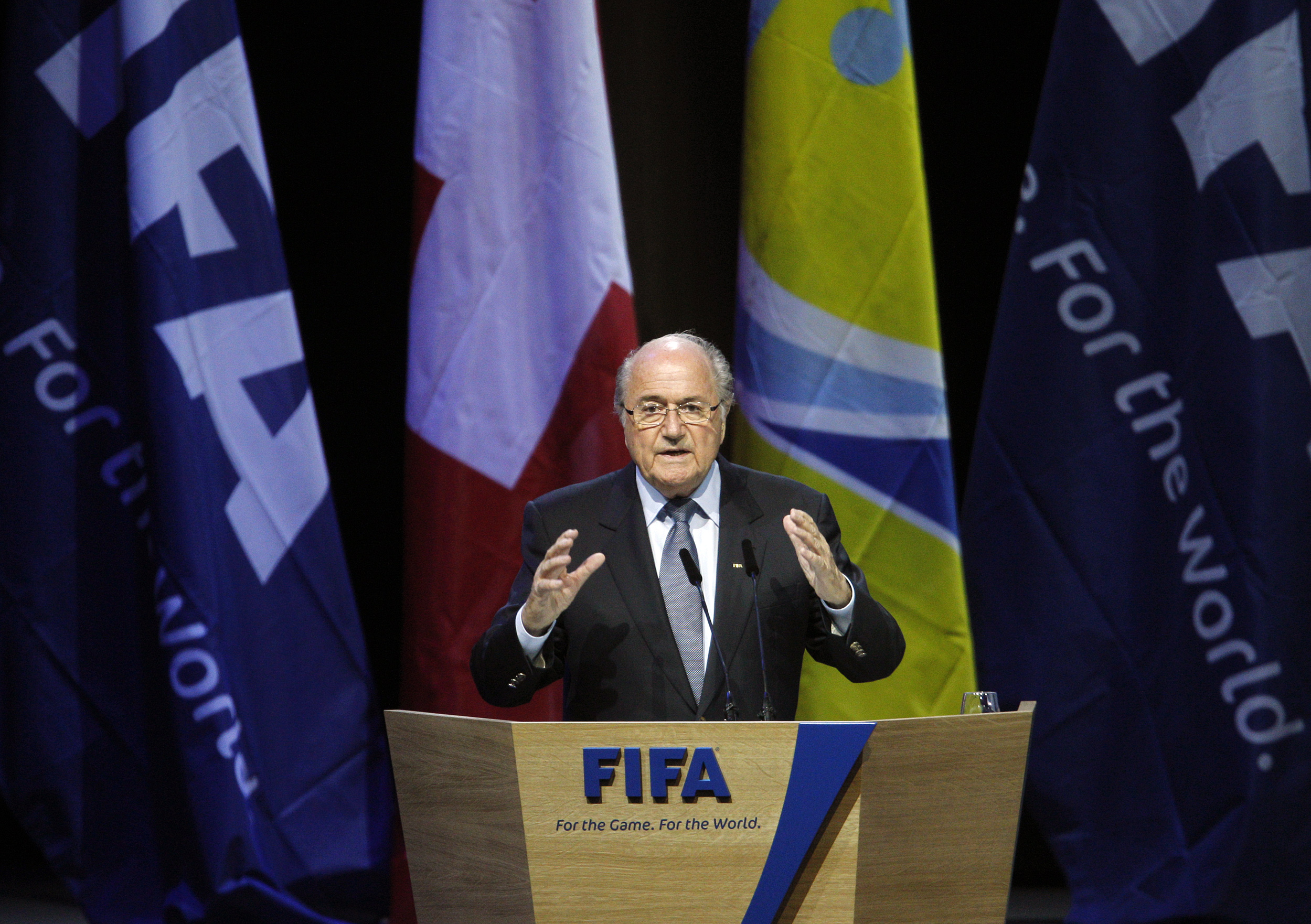Blatter “knows Fifa reforms are needed”

Transparency International’s Sylvia Schenk, author of a report on reforms for world football’s Zurich-based governing body, talks to swissinfo.ch about Fifa’s will to change.
The report by the global anti-corruption watchdog published on Tuesday urges detailed reforms such as independent investigations into past corruption allegations and an independent stakeholder group to oversee probes and changes.
The organisation calls on Fifa to review how it investigates alleged corruption and to publish more detailed financial reports, including executive bonuses and staff salaries. Fifa should also protect whistleblowers, impose two-term limits for elected officials and open its decision-making to outside scrutiny instead of being “opaque”.
The eight-page reform agenda was finalised by Transparency International experts after meetings and talks with Fifa’s Swiss president Sepp Blatter and Fifa representatives in Zurich.
swissinfo.ch: Do you believe Fifa, and Sepp Blatter, have the willingness or the culture to change?
Sylvia Schenk: I have the impression that Mr Blatter knows they have to do something about it. We will see in the future how far they go. It is very important to have all the proposals on the table in public to see which are then accepted by Fifa.
It will be very difficult for them to say in the future ‘we are implementing points 1-3 but not 4-10 of your proposal’.
I have the impression that there may be acceptance of an independent group, but we will see in the coming months.
It’s difficult to talk about Fifa as a whole as there are different groups that make up Fifa. I believe the staff have a great willingness to reform and a great deal has been done regarding accounting and reporting. But the main problem is at the very top level of decision-making with Fifa bodies and officials.
swissinfo.ch: Fifa said it welcomed the report but added it had zero tolerance toward any form of corruption in football and several of the best practices and recommendations made were already being implemented, and that others will be soon. This doesn’t suggest they are very willing to take on board your ideas…
S.S.: I don’t have that feeling. I think it’s an attempt to show they have understood the report and are working on things. I know from our discussions that they are working on proposals concerning the ethics committee, but they can’t yet be publicised as they need executive committee approval.
swissinfo.ch: You have urged Fifa to order independent investigations into past corruption allegations to help overcome a crisis of trust. What allegations are you referring to?
S.S.: A lot of allegations come up again and again. We have the current scandals over the awarding of the 2018 and 2022 World Cups. Then the one surrounding the congress elections this year that the ethics committee is investigating. But people still say there is
more to investigate.
There are other issues, for example surrounding members of the executive committee like the Brazilian Football President Ricardo Teixeira and his personal involvement in the World Cup organising committee and companies working for the preparation of the 2014 World Cup.
Then there is the ISMM-ISL case [the 2001 bankruptcy of FIFA’s former marking partner]. We have recommended that Fifa declare this affair of public interest to help the Swiss courts disclose the information.
swissinfo.ch: You are also sending the report to national football federations. Do you seriously believe they can exercise any kind of external influence on Fifa?
S.S.: At the June congress most national federations didn’t want to really control the executive committee. But if they want to they can.
We are not sending the report to all 208 federations. We have asked our 100 Transparency International chapters to write to their national football federations and we ask the federations to discuss the issues and to exert their own pressure on Fifa.
The most important thing to really push Fifa is to have pressure from both outside via civil society, sponsors and media, and from inside. There are football organisations that want change and federations that voted against Blatter, and there are professional clubs that are critical as shown by recent comments by European Club Association President Karl-Heinz Rummenigge.
swissinfo.ch: The Federal Sports Office is also investigating whether changes to the law could bring sporting bodies into line with corporations under Swiss anti-corruption legislation. Do you think the Swiss authorities can influence Fifa?
S.S.: For sure. Whatever happens in Switzerland – and I hope the discussions continue – puts not only direct pressure on Fifa but indirectly doubles and triples the pressure by other sports federations in Switzerland.
The other sports federations are concerned about discussions that the Fifa crisis has triggered in Switzerland. I have the feeling some of them don’t want to lose their privileges.
There is some peer pressure on Fifa, so it’s very important that discussions continue in Switzerland regarding changes to the law to make sports organisations like Fifa more accountable to the outside world.
Maybe that will not help with all cases – I doubt that election campaign bribery would constitute a criminal act under private bribery law – but simply changing the law to include sporting organisations would send a big signal that sport is not outside the law as it has been considered up to now.
Fifa, football’s world governing body, has been dogged by allegations of corruption for many years.
Sepp Blatter’s victorious 2002 presidential election campaign was marred by claims the election was rigged.
Fifa set up an ethics committee in 2006 to look into allegations of corruption surrounding the sport.
In 2008 a judicial case in Zug implicated unnamed Fifa officials in a multi-million dollar kickback scandal involving bankrupt sport marketing firm ISMM-ISL.
Last year’s vote to award the 2018 and 2022 World Cup tournaments to Russia and Qatar was also mired in allegations of bribery and sold votes.
Blatter promised to clean up his so-called “football family” and change how it does business, after winning election to a fourth and final four-year presidential term in June.
Qatar’s Mohamed bin Hammam, who stood against Blatter, was banned for life last month after being judged by Fifa’s ethics committee to have arranged bribes for Caribbean voters. Bin Hammam denies the charge and has said he will appeal.
Fifa vice-president Jack Warner resigned rather than face investigation for his alleged role in the scandal. Two other executive committee members, Amos Adamu and Reynald Temarii, were suspended last year after being investigated over World Cup vote-trading, along with four Fifa officials.
The ethics committee is investigating 16 Caribbean officials suspected of accepting cash bribes from bin Hammam. Meanwhile the FBI is reportedly examining the financial records of Chuck Blazer, the US member of Fifa’s executive committee and general secretary of CONCACAF, the sport’s governing body in North and Central America and the Caribbean.

In compliance with the JTI standards
More: SWI swissinfo.ch certified by the Journalism Trust Initiative















You can find an overview of ongoing debates with our journalists here . Please join us!
If you want to start a conversation about a topic raised in this article or want to report factual errors, email us at english@swissinfo.ch.